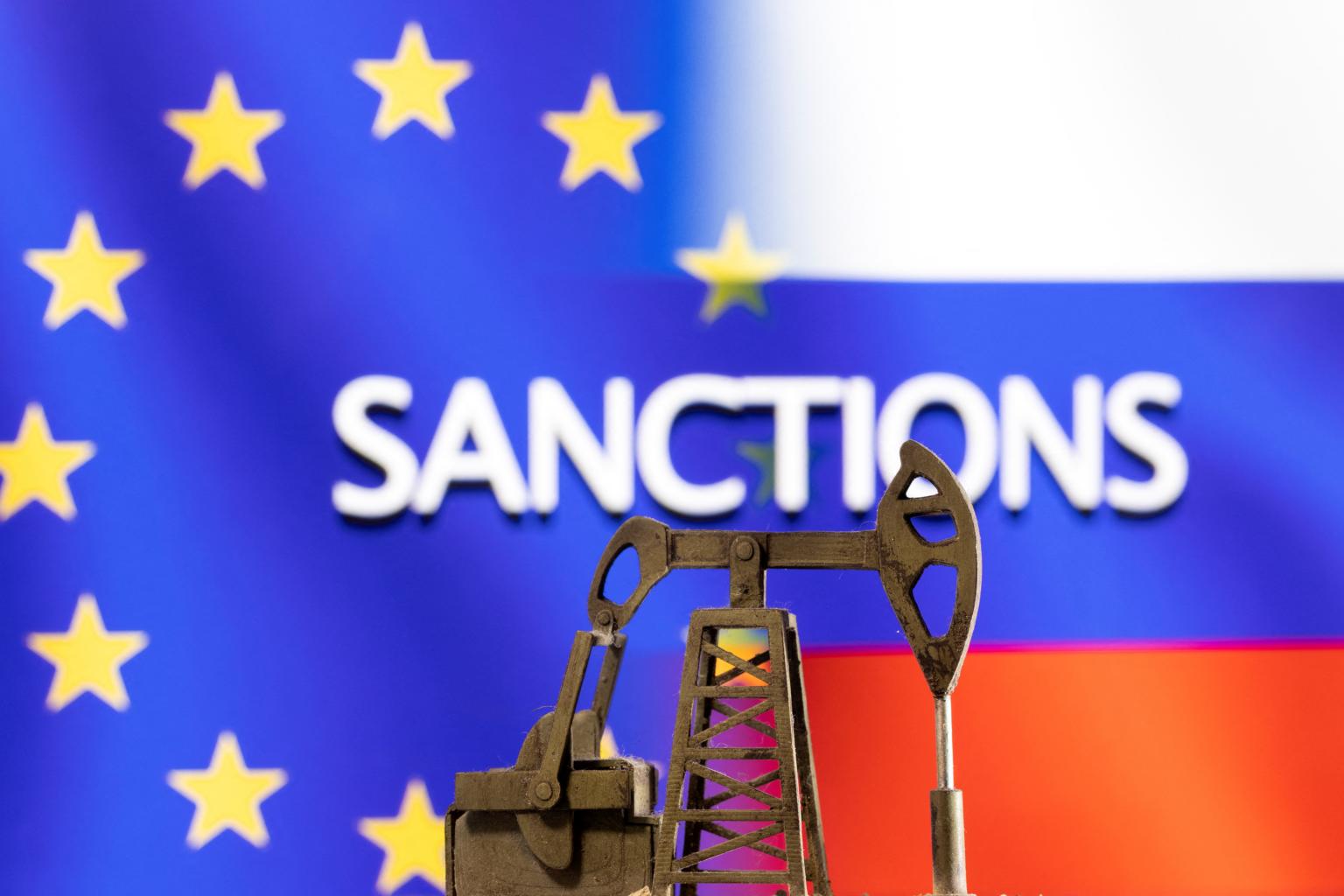EU to mull Russian oil embargo with Biden set to join talks
Sign up now: Get ST's newsletters delivered to your inbox

Moscow has warned that EU sanctions on Russian oil could prompt it to close a major gas pipeline to Europe.
PHOTO: REUTERS
Follow topic:
BRUSSELS (REUTERS) - EU foreign and defence ministers meet on Monday (March 21) to discuss imposing further sanctions on Moscow, especially whether to impose an oil embargo on Russia over its invasion of Ukraine.
The foreign ministers of at least two countries, Ireland and Lithuania, said the EU should target Russia's lucrative energy sector.
Trying to force a Russian military withdrawal, the European Union and its Western allies have already imposed a panoply of sanctions including freezing the Russian central bank’s assets.
The humanitarian crisis in the port city of Mariupol, where residents are besieged with little food, water and power, is increasing pressure on European leaders to toughen sanctions on Moscow.
“Looking at the extent of the destruction in Ukraine right now it’s very hard to make the case that we shouldn’t be moving in on the energy sector, particularly oil and coal,” Irish Foreign Minister Simon Coveney said as he arrived at the meeting being held in Brussels.
“It’s unavoidable we start talking about the energy sector, and we can definitely talk about oil because it is the biggest revenue to Russia’s budget,” Lithuanian Foreign Minister Gabrielius Landsbergis said as he arrived at the same meeting.
The credibility of the West was on the line, he said.
“We cannot get tired of imposing sanctions, we cannot get tired of bringing assistance and help to Ukraine,” he said.
US President Joe Biden arrives in Brussels on Thursday for summits with Nato’s 30 allies, the EU, and in a Group of Seven (G7) format including Japan, designed to harden the West’s response to Moscow.
The Kremlin has so far not been moved to change course in Ukraine by four rounds of EU sanctions imposed over the past three weeks, including on 685 Russians and Belarusians and on Russian finance and trade.
A fifth round of sanctions will include adding more names to the EU blacklists. But the economically toughest choice is whether to target Russian oil, as the United States and Britain have done, given the 27-nation EU’s dependence on Russian gas for energy.
Diplomats told Reuters that Baltic countries including Lithuania are pushing for an embargo as the next logical step, while Germany is warning against acting too quickly because of already high energy prices in Europe.
Bulgaria, which is almost completely dependent on gas supplies from Russia's Gazprom, has said it might seek an opt-out.
Bulgaria's sole oil refinery is owned by Russia's Lukoil and provides more than 60 per cent of the fuel used in the Balkan country.
As the EU defence and foreign ministers met in Brussels, the Kremlin said Europe would be hit hard in the event of an embargo on Russian oil, striking the continent's energy balance, but would not affect the US.
It warned that EU sanctions on Russian oil could prompt it to close a gas pipeline to Europe.
“Such an embargo would very seriously impact the global oil market, very badly impact energy balance on the European continent,” Kremlin spokesperson Dmitry Peskov told reporters on a daily conference call.
“Americans would remain as they are and would feel much better than Europeans (in the event of oil embargo). This would be hard for Europeans – such a decision would hit everyone,” Peskov said.
Russia invaded Ukraine on Feb 24. Mr Putin has called Russia's actions a "special operation" meant to demilitarise Ukraine and purge it of what he sees as dangerous nationalists. Ukraine and the West say Mr Putin launched an aggressive war of choice.
France says 'no taboos' on sanctions
All EU sanctions decisions require consensus. France, which heads the EU's six-month presidency, will likely prove crucial.
President Emmanuel Macron has said that if the situation worsens in Ukraine - where thousands have been killed, more than five million people have been displaced and some cities devastated by shelling - there should be no "taboos" in terms of sanctions.
"These sanctions are meant to force President Putin into a new calculation," a French presidency official said.
"Among our partners and among the countries trading with Russia, there are some who are more sensitive on the issue of oil and gas. Nevertheless, the President (has) said there is no taboo."
Elsewhere, Dutch Prime Minister Mark Rutte said on Monday EU countries still largely depend on Russian oil and gas for their energy supply and can’t simply cut themselves off on short notice.
“Too many refineries in the eastern and western part of Europe still completely depend on Russian oil and with gas it’s even worse”, Rutte told reporters after a meeting with Lithuanian President Gitanas Nauseda in Vilnius.
“We have to deleverage that dependency. We need to do it as speedily as possible, but we can’t do this tomorrow.”

